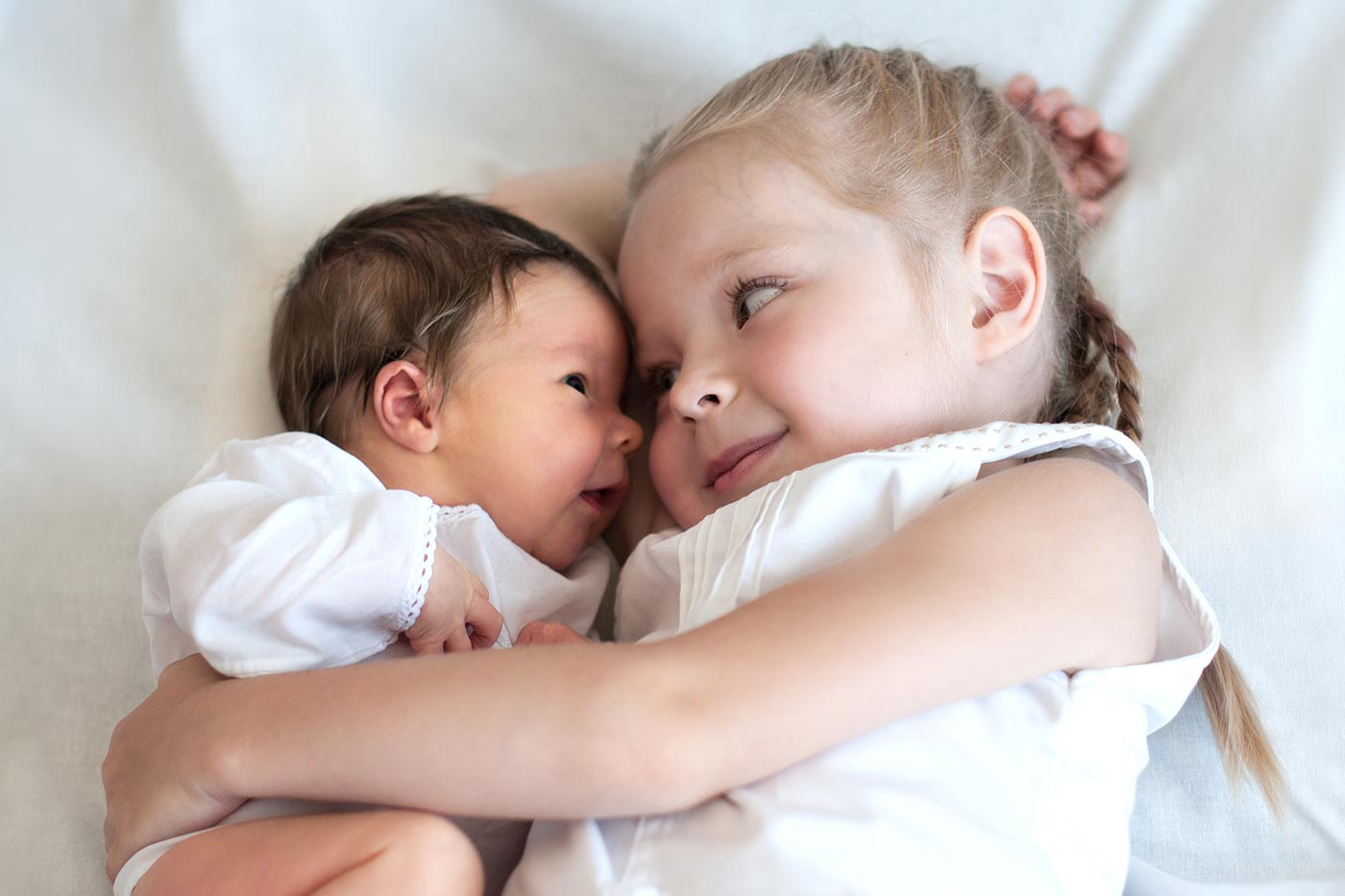How to Encourage Siblings to Get Along
Sibling rivalry isn’t inevitable. Many kids CAN develop a strong bond. Here’s how to encourage siblings to get along, even from a young age.
 It took my eldest several weeks to adjust to his new brothers. I don’t blame him, either—the change was hard enough for us, and we knew what we were getting into.
It took my eldest several weeks to adjust to his new brothers. I don’t blame him, either—the change was hard enough for us, and we knew what we were getting into.
Still, I wanted my kids to have a good sibling relationship—one that doesn’t have to wait until they’re older to benefit from.
You see, I never liked the stereotype of siblings fighting, bullying, or tattling on one another. Instead, I want my kids to grow up to be one another’s best friends throughout adulthood. I truly do think it’s possible, and that they’re on their way there.
Perhaps you also want to nurture a genuine friendship among your little ones. If so, check out how to encourage kids to get along right from the start:
Table of Contents
1. Don’t solve all their sibling conflicts
Even at a young age, my kids have gotten into arguments with another other, from vying for the same toy to getting into each other’s spaces.
Still, I don’t step in unless needed. Instead, I observe and see how they’ll handle the situation. In most cases, they end up resolving the issue, from figuring out how to play with the same toy together to one of them realizing it’s not worth the trouble.
Yes, step in when things get physical, like when a toy might hit someone’s head or they’re about to hurt each other. Otherwise, let kids resolve their own social conflicts as much as possible.
If you do need to step in, offer solutions instead of outright solving their problems. For instance, “sportscast” and describe what’s happening, and prod them for suggestions. “She wants to stand next to you but you look like you want your space. What do you think you can do?” This can help them develop problem-solving skills to handle matters on their own.
And don’t make a big deal about it. Jumping in with solutions or refereeing can escalate it into a bigger problem than it needs to be. Like I say in my ebook, Parenting with Purpose:
“Yes, it’s uncomfortable watching your kids struggle. We feel compelled to be peacemakers and bring order right away. The problem with resolving their conflict is they don’t get to learn from their interaction. You’re not able to teach them valuable social skills like waiting, turn-taking, and sharing.”
Free resource: Want to learn more about putting parenting tips into action? Grab the bonus chapter of Parenting with Purpose—at no cost to you. You’ll also get my newsletters, which parents say they LOVE:
“I can’t tell you how much I needed to hear this. Your email has made me put things in perspective. Thank you for all your emails and words of encouragement. They do not go unnoticed.” -Karen K.
2. Treat toys as communal property
Disclosure: This article contains affiliate links. As an Amazon Associate, I earn from qualifying purchases.
We assume kids will get along much better if we define which item belongs to whom. No fighting over the same toys, right?
Instead, studies found that scarcity leads to cooperation. The fewer toys kids have, the more they’re forced to find a way to play with one another.
Other than setting boundaries with a few cherished items, one of your family rules might be that most toys belong to everyone. Don’t ask your kids if their siblings can use their toys (“Can he play with your fire truck?”). This eliminates the “This is mine!” possessiveness that can often trigger a fight.
And find collaborative games where all the kids are on the same side and practice teamwork. One of our favorite board games is Race to the Treasure. Rather than the kids competing with each other, they work together to “beat the ogre.”
3. Don’t force kids to share
Ideally, kids will share on their own, but to demand them to do so isn’t fair. Instead, encourage them to take turns or play together. Let’s say one child wants to play with something that the other one has. Tell them to decide how to play with each other or to take turns.
If a struggle is about to happen, guide them to a solution. You might track whose turn it is to press the button, or ask one child to scoot over so the other one could have some space to play too.
Forcing them to share gets the job done, but begrudgingly. Instead, nurture a genuine desire to share.
4. Let your older child teach
My 4 year old was playing with a guitar when he shrieked, “He’s climbing on me!” He didn’t know what to make of his baby brother crawling on his lap, drawn by the music.
“Oh, it looks like he wants to play too. Show him how to play the guitar.”
The boy who, a second ago was recoiling from his baby brother, was now saying, “See? You pull it like this,” and teaching him how to pluck the strings.
Any time your eldest is on the verge of getting upset, tell her that her younger sibling wants to learn from her. Lecturing or telling her to calm down misses an opportunity for them to play with and learn from one another.
Being a teacher can make her feel more mature. Teaching also lets her take back the power she sometimes loses for being a child. Now, she’s the “big kid” who has a thing or two to teach her little brother.
5. Don’t let your older child “parent”
While older kids have more privileges and responsibilities, they also shouldn’t “parent” their siblings the same way you do.
Sure, you want your eldest to look out for her little brother, but she shouldn’t have the same authority as you do. After all, her role isn’t to be a parent but to be a big sister.
If you catch her disciplining him, tell her to stop. It’s not her place to discipline, and you wouldn’t want her siblings to resent her for that. Instead, thank her for letting you know what’s going on, and leave the parenting to you.
6. Let your older child help
Since your older child can’t “parent,” encourage her to help. She can put baby bottles away or push her brother on his trike. Tell her on many occasions how helpful she is.
You can even combine asking for her help with play time. One of the ways my eldest helped with the twins was keeping one company while I bathed the other. I placed one baby in his crib, and my eldest would play peek-a-boo with him. Not only did my eldest help me by keeping the baby entertained, but he also played with his brothers.
7. Don’t tolerate meanness
Inevitably, kids won’t get along all the time. Even if we encourage a sibling bond, they can still be downright mean to one another. That’s when we step in and prevent the animosity from getting any worse.
I don’t mind kids arguing or resolving their conflicts, but I do step in if they’re acting unfairly. I might say, “We don’t talk like that to one another,” or “Please ask him nicely.”
Encourage respect and have zero tolerance for hurtful words. They can disagree, but they must do so with respect.
8. Praise your kids when they’re getting along
Praise your kids when you see them getting along on their own. (“You guys look like you’re having so much fun playing trains together!”) Give them a smile when you see them laughing. Acknowledge that they helped each other with chores or shared their popcorn during family movie night.
Show them how happy they make their siblings or how spending time together can be a positive experience. They can learn how their actions can bring joy to others.
Of course, don’t over-praise to the point where they do things just to get your attention. After all, sibling harmony should be a normal part of life, not a novelty. Still, a good way to establish positive behavior and healthy relationships is to praise your kids when they get along.
Conclusion
Despite the stereotypical “sibling rivalry,” you can encourage a good relationship among your kids during early childhood, no matter their ages.
Don’t solve all their conflicts, force them to share, or allow them to be mean to one another. Instead, treat toys as communal property and praise the times when they do get along. Encourage your older child to teach and help younger siblings instead of “parenting” them on your behalf.
Sibling harmony isn’t only about making sure no one is fighting, keeping tabs on whose toy is whose, or forcing them to share. Instead, developing a strong sibling bond that lasts over a lifetime is when each child feels a genuine love for his or her siblings—right from the start.
Get more tips:
- Are You Balancing Your Children’s Needs Fairly?
- When Your Child Regresses Because of New Baby Jealousy
- How to Teach Toddlers to Share
Don’t forget: Join my newsletter and grab the bonus chapter of Parenting with Purpose—at no cost to you:



